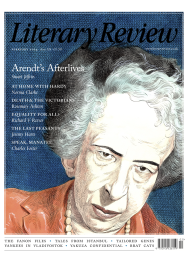James le Fanu
The DNA Supremacy
Tyranny of the Gene: Personalized Medicine and Its Threat to Public Health
By James Tabery
Alfred A Knopf 336pp £25
Twenty years have passed since the Human Genome Project mapped nearly all twenty thousand genes encoded within the three billion molecules of DNA strung out along the two intertwining strands of the double helix. ‘We face a time of dramatic change,’ commented the project’s director, Francis Collins, anticipating ‘unprecedented opportunities’ for medicine and science in the wake of this landmark achievement. At the time, it was expected that the genes involved in common illnesses (diabetes, heart disease, Alzheimer’s and so on) would soon be discovered, allowing pharmacological innovation to be reoriented towards targeted therapies. Pinpointing the genes that had gone awry in cancer cells, meanwhile, would usher in an era of personalised, ‘precision’ oncology. Since then, genetics has become the dominant discipline in biomedical research: massive studies sequencing the genomes of thousands of participants have become routine.
And yet for all the enthusiasm (and hype), the cornucopia of scientific papers and the acres of newspaper coverage, those ‘unprecedented opportunities’ have largely failed to materialise: the genes implicated in common illnesses remain elusive, and ‘gene-centred’ anti-cancer drugs are immensely costly and for the most part of limited efficacy.
Professor of philosophy James Tabery’s Tyranny of the Gene is a thoroughly illuminating account of the reasons for this discrepancy between promise and reality. He contends, as his title suggests, that genetics has come to ‘tyrannise’ medical research, marginalising potentially more fruitful lines of enquiry.
All humans, by definition, share the same complement of genes. Within the three billion human DNA molecules, the arrangement of the four chemical bases that make up the code (designated by the letters C, G, A and T) differs between individuals in approximately ten million cases. These ‘single letter differences’

Sign Up to our newsletter
Receive free articles, highlights from the archive, news, details of prizes, and much more.@Lit_Review
Follow Literary Review on Twitter
Twitter Feed
It wasn’t until 1825 that Pepys’s diary became available for the first time. How it was eventually decrypted and published is a story of subterfuge and duplicity.
Kate Loveman tells the tale.
Kate Loveman - Publishing Pepys
Kate Loveman: Publishing Pepys
literaryreview.co.uk
Arthur Christopher Benson was a pillar of the Edwardian establishment. He was supremely well connected. As his newly published diaries reveal, he was also riotously indiscreet.
Piers Brendon compares Benson’s journals to others from the 20th century.
Piers Brendon - Land of Dopes & Tories
Piers Brendon: Land of Dopes & Tories - The Benson Diaries: Selections from the Diary of Arthur Christopher Benson by Eamon Duffy & Ronald Hyam (edd)
literaryreview.co.uk
Of the siblings Gwen and Augustus John, it is Augustus who has commanded most attention from collectors and connoisseurs.
Was he really the finer artist, asks Tanya Harrod, or is it time Gwen emerged from her brother’s shadow?
Tanya Harrod - Cut from the Same Canvas
Tanya Harrod: Cut from the Same Canvas - Artists, Siblings, Visionaries: The Lives and Loves of Gwen and Augustus John by Judith Mackrell
literaryreview.co.uk